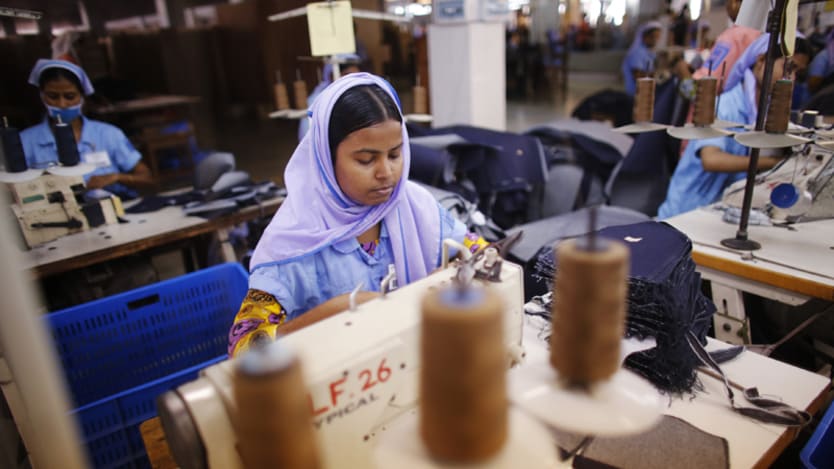
BERLIN — A draft law leaked earlier this year would require German companies to take more responsibility for monitoring their subsidiaries and contractors abroad for human rights violations, or risk fines or even jail time for their executives.
The proposal falls into a broader trend in Europe, as governments pressure their multinationals to take accountability for conditions in supply chains that can lead to deadly incidents or environmental damage. Several European countries are in the process of negotiating legislation after France adopted a law in 2017.
“[The draft] has enriched the debate a lot. It shows what such a law could look like."
— Johannes Blankenbach, representative, European Union, Business & Human Rights Resource CentreThe German proposal goes further than the French, which only affects companies with more than 5,000 employees. The draft, leaked out of Germany's Federal Ministry for Economic Cooperation and Development, or BMZ, would apply to companies with more than 250 employees and €40 million ($45 million) in annual turnover.
The need is clearly there, advocates say. The Business & Human Rights Resource Centre, a global research and advocacy organization, has approached German companies about potential human rights abuses 280 times since 2005, the third-most behind United States and United Kingdom-based institutions.
Johannes Blankenbach, the center's representative for the European Union, said that reflects the reach of Europe's largest economy.
"It comes along with an extraordinary amount of responsibility with the economic weight and the supply chains they are linked to," he told Devex. Germany instituting mandatory due diligence for its companies could have an outsized impact — not only on its own companies but also in encouraging lower-income countries to introduce protections or improve enforcement.
The law's passage is far from certain, though, and risks being eclipsed by a drive to get businesses to introduce safeguards voluntarily.
A race to the bottom
5 years after Rana Plaza, worker safety has improved, but more remains to be done
The building collapse at Rana Plaza killed 1,134 garment workers, sparking outrage across the world. The initiatives delivered since seem to have improved workplace safety, but many wonder what's next as the government readies to take over.
The April 2013 collapse of Bangladesh’s Rana Plaza, an eight-story building housing clothing factories, drew global attention to the conditions that textile workers were forced to suffer — as well as to the role that multinationals, in their push to reduce prices, often played in encouraging lower-income countries to forgo or ignore regulations on worker protections.
"This creates this downward race to the bottom," Alice Evans, a lecturer at King's College London and author of a forthcoming book on corporate accountability in supply chains, told Devex. "When one country represses, export competitors are likely to follow suit because they need to keep the prices low." It also allows multinationals to shift the blame to the lack of local regulations when disaster strikes.
The tragedy drew greater attention to the “Guiding Principles on Business and Human Rights,” which the United Nations Human Rights Council had endorsed two years’ earlier. The principles acknowledge that international law does not require states to regulate the activities of domestic businesses abroad, but emphasize that they are able to, and set out how.
There has been a push since then for countries to introduce national action plans, which translate the principles into concrete policies. The U.N. has so far registered 21 countries with a completed NAP.
In Germany, the issue of due diligence in supply chains has been on the current government's radar since it took power in 2017. Under the country’s 2014 NAP, businesses are encouraged to implement their own due diligence policies. The new coalition government agreed to implement legislation if they find that fewer than half of corporations have done so by 2020.
But civil society groups worry about how companies’ efforts will be monitored. And businesses who have implemented due diligence procedures worry that, under a voluntary process, their competitors will not.
"Several existing initiatives in the textile industry have proven that a voluntary approach is not ideal and, in fact, doomed to fail," Ansgar Lohmann, head of corporate social responsibility for discount clothing chain KiK, told Devex in an email. The retailer bought clothes from producers in Rana Plaza and has subsequently become an advocate for standardized regulations.
"Companies that are highly engaged may suffer from competitive disadvantages as their production costs could rise,” he said.
Johanna Kusch, a corporate responsibility officer with the global justice NGO Germanwatch, is also concerned that the 2020 deadline falls just before the next federal elections, meaning the legislation is unlikely to be in place before a new government takes over.
Development minister Gerd Müller is said to be a keen advocate of the issue, and those worries may have prompted BMZ to draft the law, dated Feb. 1, although the ministry would not confirm that.
A spokesperson said “while we will continue to support these measures ... we have to ensure that all sectors and all companies meet their obligations ... hence the considerations on key points for a potential supply chain legislation.”
Will it ever be more than a draft?
Civil society groups are happy with what they see in the draft, although BMZ cautioned it is subject to change. In addition to being further-reaching than the French law, it would compel companies to carry out assessments of their supply chains and appoint an officer to monitor compliance and register complaints. Companies that fail to meet the guidelines risk fines of up to €5 million, and officials could face prison sentences.
Kusch said there is a need to strengthen the environmental protections in the legislation, which can be more difficult to elaborate than human rights violations, and to broaden its reach to encompass the full supply chain. The biggest concern, though, is that it will simply be sidelined.
Evans said the leak is "not a sign that change is going to happen. It's more a sign of [Müller's] desperation" to get the legislation through.
Observers cautioned that the development ministry alone does not have the strength to guide the draft through the legislative process; and more powerful ministries, such as finance and labor, have not shown any support for it.
That might change with additional pressure from civil society and businesses. But even if a law is not immediately forthcoming, Blankenbach said the draft, "has enriched the debate a lot. It shows what such a law could look like."
Search for articles
Most Read
- 1
- 2
- 3
- 4
- 5








